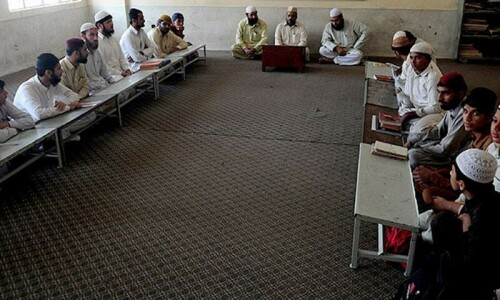ISLAMABAD: The Food and Agriculture Organisation (FAO) of the United Nations has introduced a tool that made it easier for decision makers to assess the acute food insecurity of agricultural households and analyse its drivers when such shocks occur.
The Data in Emergencies (DIEM) Information System, developed and funded by the Bureau of Humanitarian Assistance of USAID, with contributions from the European Union and the Special Fund for Emergency and Rehabilitation Activities (SFERA) of FAO, is currently active in more than 25 food-crisis countries and the DIEM-Monitoring system surveys about 150,000 households per year, representing more than 650 million people.
One interesting example is Pakistan, where DIEM expertise facilitated a post-disaster damage and loss exercise for the whole agricultural sector after devastating floods in June-September last year.
The results were then displayed on an interactive map on the DIEM hub, which breaks down overall damage and loss into sub-sectors (crops, livestock, fisheries) per province affected.
DIEM information system currently active in more than 25 food-crisis countries
Another recent example of its use for FAO partners was in relation to the February earthquake that devastated large areas of Turkiye and Syria. Within days of the event, the DIEM team produced a preliminary analysis of cropland exposed to differing levels of earthquake intensity and displayed this as an interactive map with detail at both district and sub-district level. This kind of product is fundamental for the targeting of on-the-ground assessments and emergency assistance.
Detailed, comprehensive and timely data is essential to address the impact of shocks such as droughts, earthquakes or conflict on agricultural production and livelihoods in parts of the world affected by food crises.
This is the first time that data focusing on agricultural livelihoods in food crisis contexts is being collected on this scale and frequency. The platform aims to support FAO members, United Nations’ agencies, the donor community and other stakeholders in informing decisions designed to trigger the appropriate anticipatory and response actions in support of agricultural livelihoods.
The data is collected multiple times per year in the world’s most food-insecure countries — at household level through computer-assisted telephone inter-views and face-to-face surveys — and is published on the Hub rapidly thereafter.
The data processing and analysis is completed in just three days, while the entire lifecycle — from data collection to validation and publication — takes just 30 days.
Transparency and open data are key aspects of the project. Anyone can create a DIEM account to explore surveys, navigate dashboards, export maps and download data. This ensures that DIEM activities serve as public goods and that the humanitarian community, academics, media and all stakeholders can benefit from the large amount of data that is available to everyone.
The shocks analysed by DIEM comprise both natural and human-induced hazards. They include climate-related hazards, earthquakes, volcanic eruptions, invasive pests, conflict and violence, as well as economic shocks.
In addition to regular food crisis monitoring, the DIEM platform also provides an integrated picture of the impact of large-scale hazards (severe shocks) on livelihoods and an estimate of the dollar value of damage and losses to the agriculture sector. This is achieved by combining remote sensing, secondary data review, household surveys, key informant interviews, focus group discussions and crowd-sourcing surveys.
Published in Dawn, May 11th, 2023















































Dear visitor, the comments section is undergoing an overhaul and will return soon.